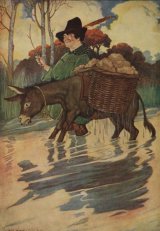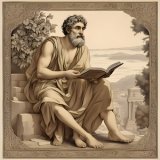The Ass and the Load of Salt
The Ass and the Load of Salt is a fable by Aesop about a merchant and his donkey. The donkey stumbles during their journey and discovers by accident that the load of salt he was carrying becomes lighter when wet. Deliberately falling into the water to ease his burden, the donkey is taught a stern lesson when the merchant replaces the load of salt with a load of sponges, hence increasing the weight. The story delivers the moral lesson of deceitful actions leading to unforeseen repercussions.
Genre: Children
Genre: Children
- 35 Views
A Merchant, driving his Ass homeward from the seashore with a heavy load of salt, came to a river crossed by a shallow ford. They had crossed this river many times before without accident, but this time the Ass slipped and fell when halfway over. And when the Merchant at last got him to his feet, much of the salt had melted away. Delighted to find how much lighter his burden had become, the Ass finished the journey very gayly. Next day the Merchant went for another load of salt. On the way home the Ass, remembering what had happened at the ford, purposely let himself fall into the water, and again got rid of most of his burden. The angry Merchant immediately turned about and drove the Ass back to the seashore, where he loaded him with two great baskets of sponges. At the ford the Ass again tumbled over; but when he had scrambled to his feet, it was a very disconsolate Ass that dragged himself homeward under a load ten times heavier than before. The same measures will not suit all circumstances.
Translation
Translate and read this book in other languages:
Select another language:
- - Select -
- 简体中文 (Chinese - Simplified)
- 繁體中文 (Chinese - Traditional)
- Español (Spanish)
- Esperanto (Esperanto)
- 日本語 (Japanese)
- Português (Portuguese)
- Deutsch (German)
- العربية (Arabic)
- Français (French)
- Русский (Russian)
- ಕನ್ನಡ (Kannada)
- 한국어 (Korean)
- עברית (Hebrew)
- Gaeilge (Irish)
- Українська (Ukrainian)
- اردو (Urdu)
- Magyar (Hungarian)
- मानक हिन्दी (Hindi)
- Indonesia (Indonesian)
- Italiano (Italian)
- தமிழ் (Tamil)
- Türkçe (Turkish)
- తెలుగు (Telugu)
- ภาษาไทย (Thai)
- Tiếng Việt (Vietnamese)
- Čeština (Czech)
- Polski (Polish)
- Bahasa Indonesia (Indonesian)
- Românește (Romanian)
- Nederlands (Dutch)
- Ελληνικά (Greek)
- Latinum (Latin)
- Svenska (Swedish)
- Dansk (Danish)
- Suomi (Finnish)
- فارسی (Persian)
- ייִדיש (Yiddish)
- հայերեն (Armenian)
- Norsk (Norwegian)
- English (English)
Citation
Use the citation below to add this book to your bibliography:
Style:MLAChicagoAPA
"The Ass and the Load of Salt Books." Literature.com. STANDS4 LLC, 2024. Web. 30 Apr. 2024. <https://www.literature.com/book/the_ass_and_the_load_of_salt_2299>.




Discuss this The Ass and the Load of Salt book with the community:
Report Comment
We're doing our best to make sure our content is useful, accurate and safe.
If by any chance you spot an inappropriate comment while navigating through our website please use this form to let us know, and we'll take care of it shortly.
Attachment
You need to be logged in to favorite.
Log In